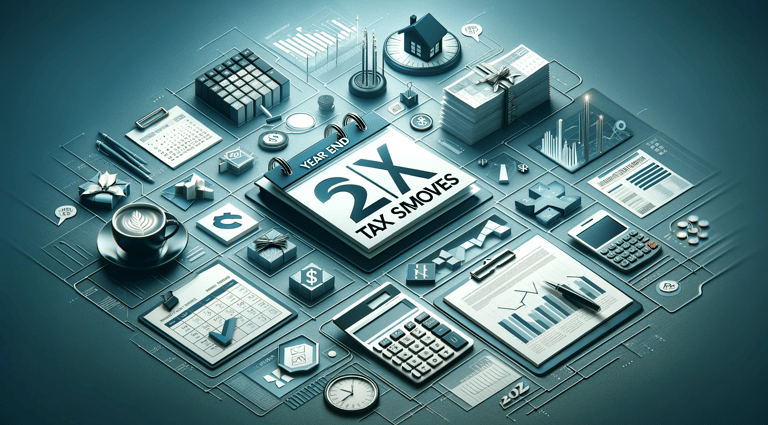Year End Tax Moves: A Comprehensive Guide for Financial Success
As the year draws to a close, savvy financial planning becomes critical, particularly in taxes. Effective year-end tax moves can significantly impact your financial landscape, providing savings and strategic growth opportunities. Let's dive into the key strategies to help you navigate this crucial period.
TAX SAVING
12/31/20233 min read


Tax Loss Harvesting
Tax loss harvesting is a strategic method to reduce your taxable income by selling off investments that have decreased in value. Imagine you’ve invested in stocks: some have soared, others have dipped. By selling those that dipped, you can offset the gains from the successful ones, thereby reducing your overall taxable income. Timing is everything – it's best to evaluate your portfolio in late November or early December to make informed decisions.
Maximizing 401K Contributions
One of the simplest yet most effective strategies is to max out your 401K contributions. In 2023, the IRS allows contributions up to $20,500 for individuals under 50 and $27,000 for those over 50. This not only builds your retirement reserves but also lowers your current taxable income. Think of it as a present to your future self that also helps your present-day tax situation.
Investing in an IRA
An IRA is an excellent vehicle for additional retirement savings with tax benefits. The two main types, Traditional and Roth IRAs, offer different advantages. Traditional IRAs provide immediate tax deductions, while Roth IRAs offer tax-free growth and withdrawals. The choice depends on your current tax situation and retirement plans. It's a decision that can shape your financial future significantly.
Deferring Income
If you expect to be in a lower tax bracket next year, deferring income can be a smart move. This could include asking for year-end bonuses to be paid in the following year or delaying business income. However, this requires a careful analysis of your income streams and potential tax scenarios.
Required Minimum Distributions (RMDs)
For individuals over 72, RMDs are a critical consideration. These mandatory withdrawals from retirement accounts, if not managed properly, can lead to unnecessary tax liabilities. Understanding the formula and timing of your distributions can mitigate these impacts.
Charitable Contributions
Charitable contributions can significantly lower your taxable income if you itemize your deductions. Donations can be in the form of cash, stocks, or property, and they need to be made to qualified organizations. Strategic charitable giving, especially with appreciated assets, can yield considerable tax benefits.
Mega Backdoor Roth
The Mega Backdoor Roth is a sophisticated strategy that allows individuals to make large contributions to a Roth IRA, beyond the standard income limits. This involves making after-tax contributions to a 401K and then rolling these over to a Roth IRA. It's a powerful tool for high-income earners, offering tax-free growth and withdrawals in retirement.
Additional Tax Moves
Beyond these strategies, consider contributing to a Health Savings Account (HSA) or a 529 college savings plan. HSAs offer triple tax advantages, and 529 plans can grow tax-free for educational expenses.
Conclusion
In conclusion, year-end tax planning is a multifaceted and crucial aspect of financial management. By taking proactive steps, you can maximize your savings and set a solid foundation for the future. Remember, every financial scenario is unique – tailor these strategies to fit your specific situation.
FAQs
How can tax loss harvesting benefit me if I’m not a high-income earner?
Even for moderate incomes, it can offset capital gains and reduce up to $3,000 in ordinary income.Should I contribute to a Traditional or Roth IRA if I expect my income to increase significantly in the future?
A Roth IRA might be more beneficial, as it locks in your current lower tax rate for future tax-free withdrawals.What are the consequences of not taking RMDs?
Failing to take RMDs can result in a hefty 50% excise tax on the amount not distributed as required.Can I still contribute to an HSA if I'm enrolled in Medicare?
No, you’re not eligible to contribute to an HSA once you’re enrolled in Medicare.Is there a limit to how much I can contribute to a 529 plan?
Yes, contributions to 529 plans are subject to gift tax rules, but they offer a unique five-year front-loading option.
